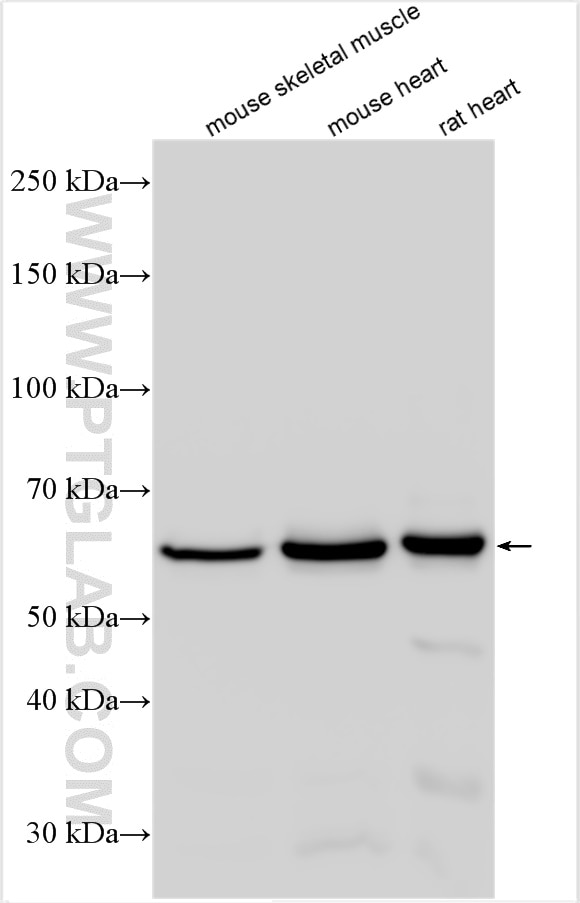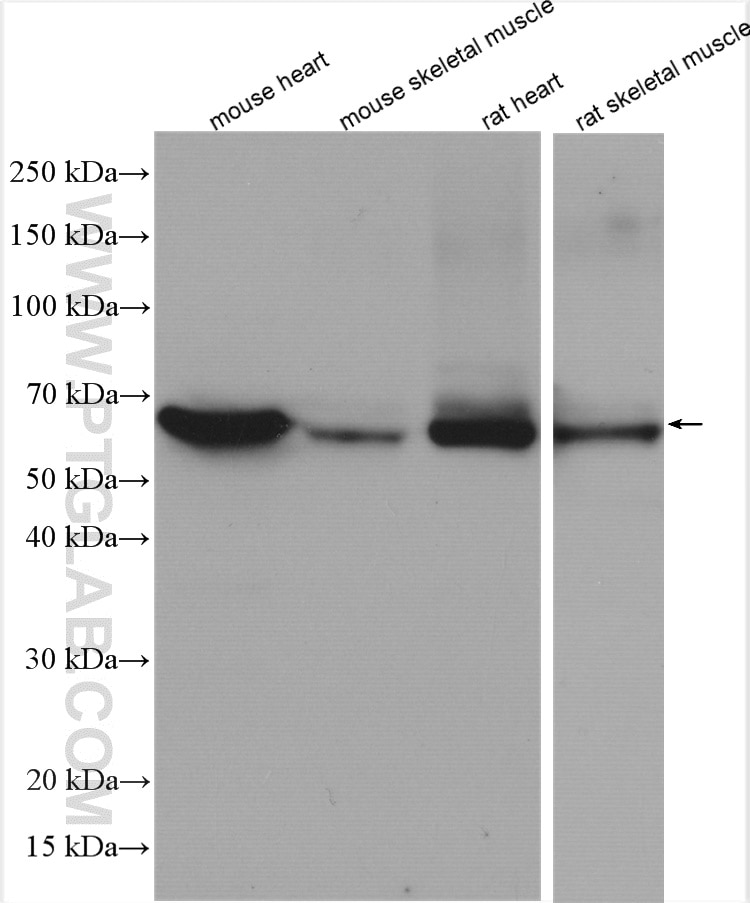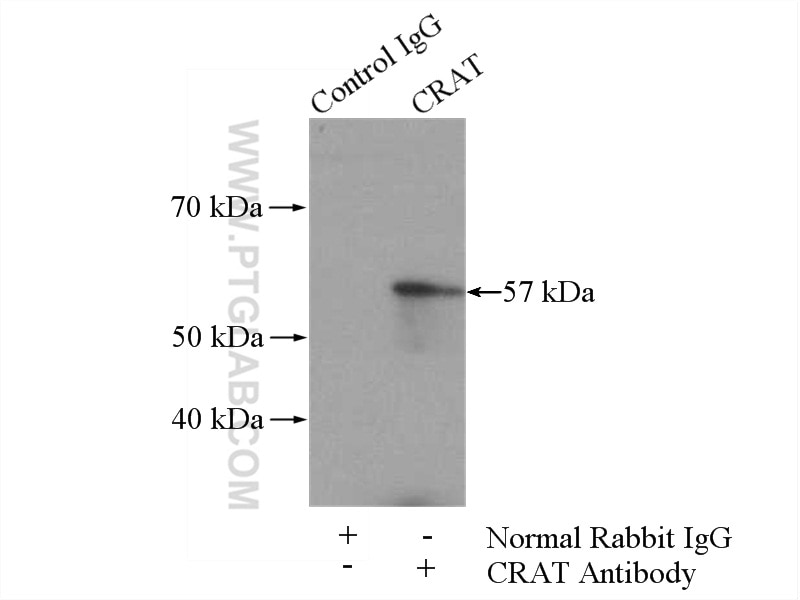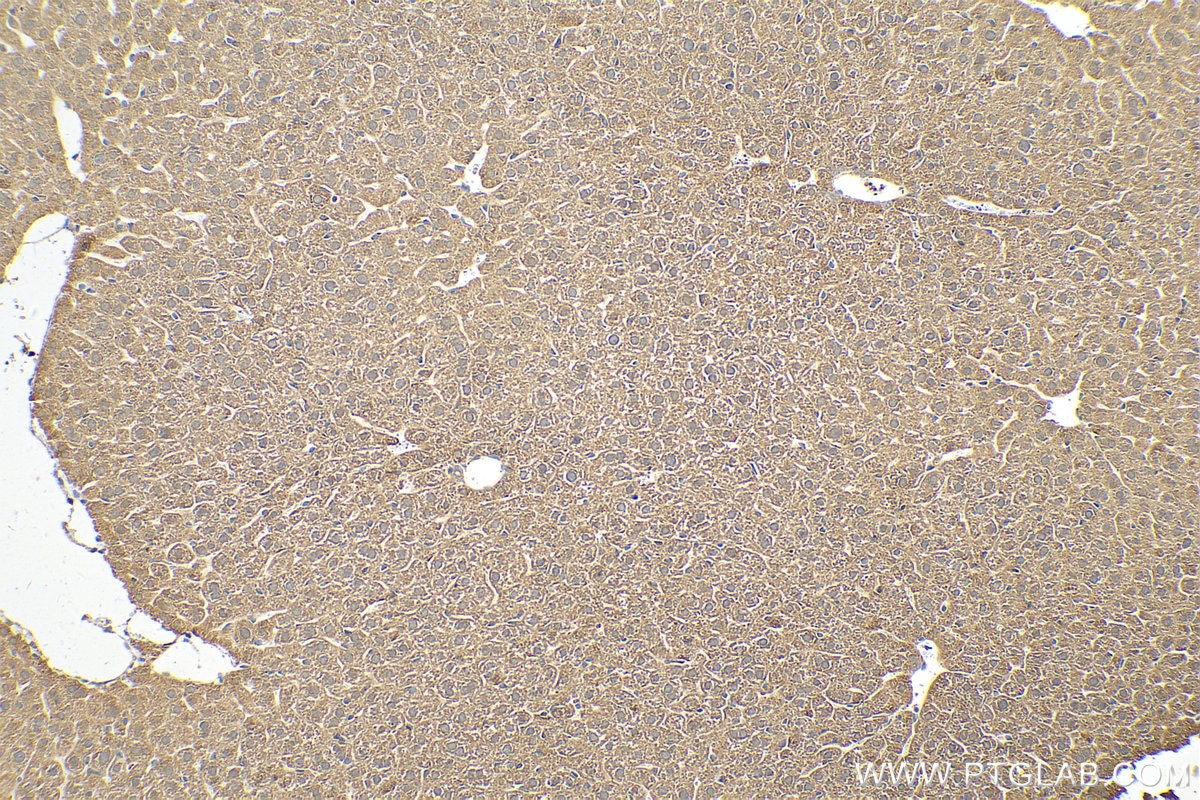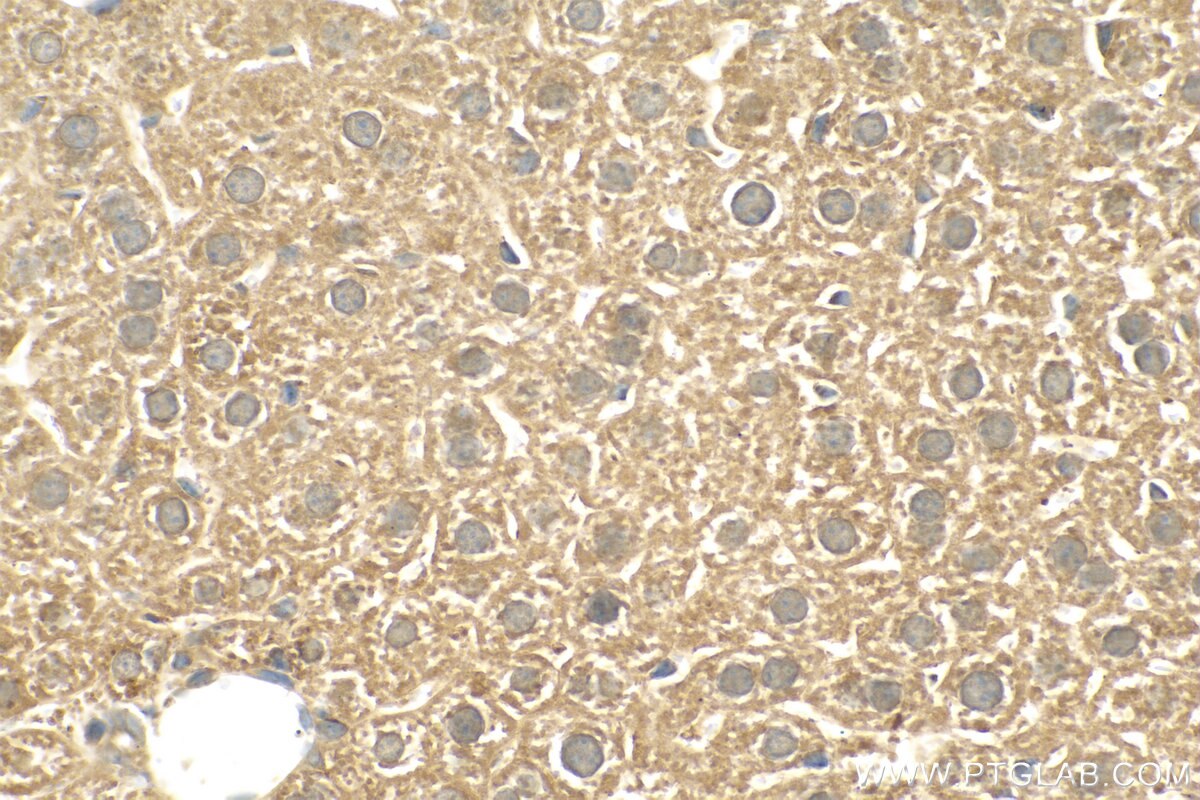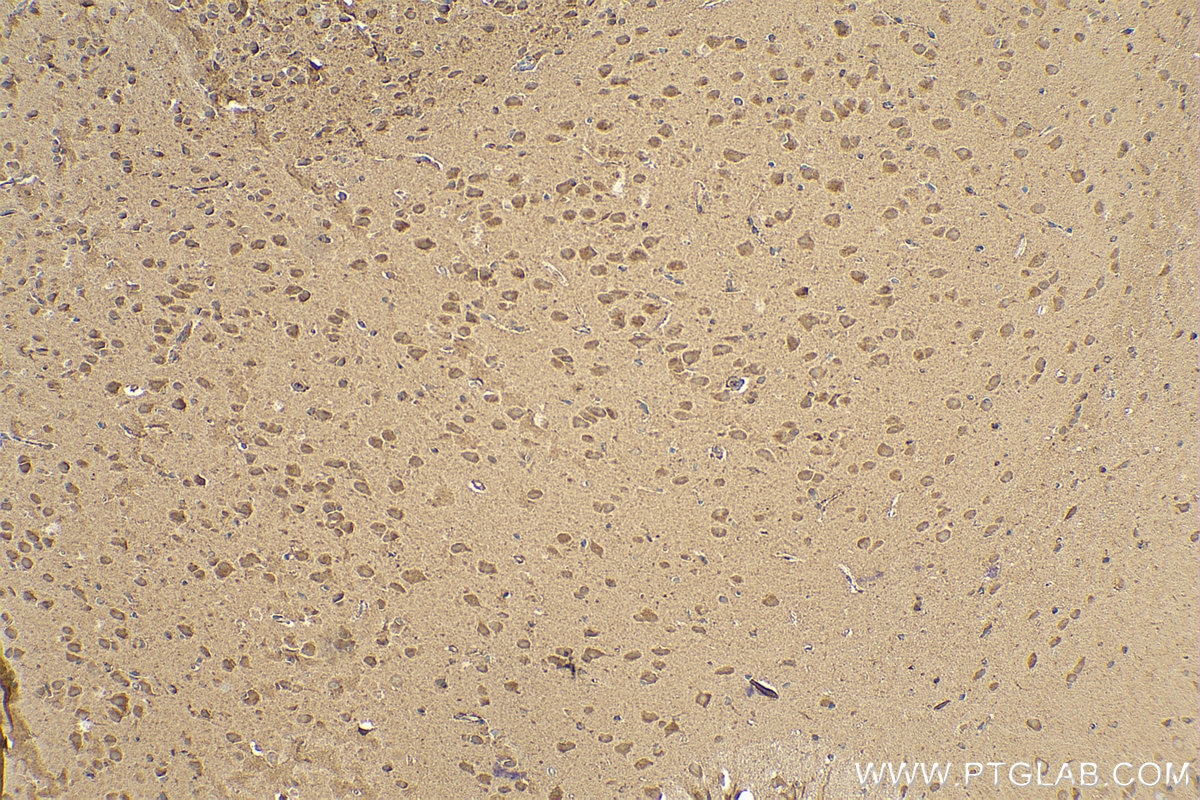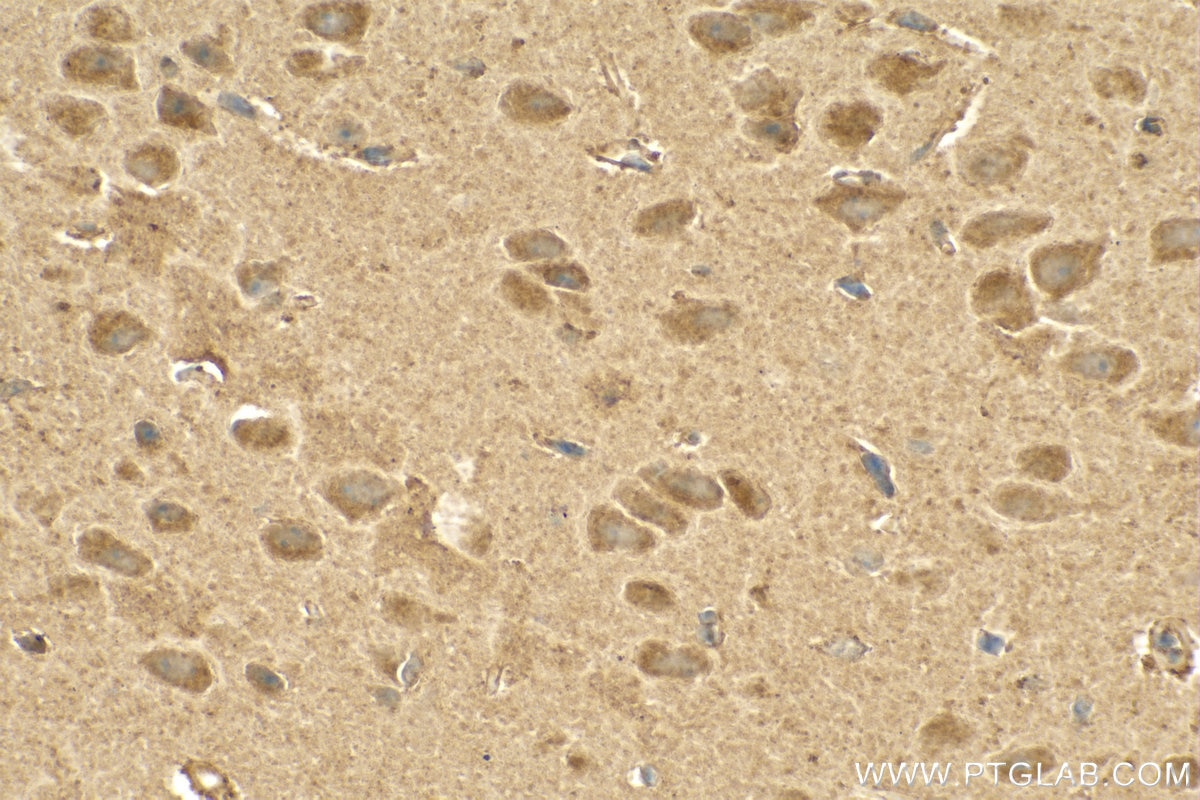- Featured Product
- KD/KO Validated
CRAT Polyklonaler Antikörper
CRAT Polyklonal Antikörper für WB, IHC, IP, ELISA
Wirt / Isotyp
Kaninchen / IgG
Getestete Reaktivität
human, Maus, Ratte und mehr (1)
Anwendung
WB, IHC, IP, ELISA
Konjugation
Unkonjugiert
Kat-Nr. : 15170-1-AP
Synonyme
Geprüfte Anwendungen
| Erfolgreiche Detektion in WB | Maus-Skelettmuskelgewebe, Mausherzgewebe, Rattenherzgewebe |
| Erfolgreiche IP | Maus-Skelettmuskelgewebe |
| Erfolgreiche Detektion in IHC | Maushirngewebe, Mauslebergewebe Hinweis: Antigendemaskierung mit TE-Puffer pH 9,0 empfohlen. (*) Wahlweise kann die Antigendemaskierung auch mit Citratpuffer pH 6,0 erfolgen. |
Empfohlene Verdünnung
| Anwendung | Verdünnung |
|---|---|
| Western Blot (WB) | WB : 1:800-1:8000 |
| Immunpräzipitation (IP) | IP : 0.5-4.0 ug for 1.0-3.0 mg of total protein lysate |
| Immunhistochemie (IHC) | IHC : 1:250-1:1000 |
| It is recommended that this reagent should be titrated in each testing system to obtain optimal results. | |
| Sample-dependent, check data in validation data gallery | |
Veröffentlichte Anwendungen
| KD/KO | See 3 publications below |
| WB | See 13 publications below |
Produktinformation
15170-1-AP bindet in WB, IHC, IP, ELISA CRAT und zeigt Reaktivität mit human, Maus, Ratten
| Getestete Reaktivität | human, Maus, Ratte |
| In Publikationen genannte Reaktivität | human, Maus, Ratte, Ziege |
| Wirt / Isotyp | Kaninchen / IgG |
| Klonalität | Polyklonal |
| Typ | Antikörper |
| Immunogen | CRAT fusion protein Ag7422 |
| Vollständiger Name | carnitine acetyltransferase |
| Berechnetes Molekulargewicht | 71 kDa |
| Beobachtetes Molekulargewicht | 62-68 kDa |
| GenBank-Zugangsnummer | BC000723 |
| Gene symbol | CRAT |
| Gene ID (NCBI) | 1384 |
| Konjugation | Unkonjugiert |
| Form | Liquid |
| Reinigungsmethode | Antigen-Affinitätsreinigung |
| Lagerungspuffer | PBS with 0.02% sodium azide and 50% glycerol |
| Lagerungsbedingungen | Bei -20°C lagern. Nach dem Versand ein Jahr lang stabil Aliquotieren ist bei -20oC Lagerung nicht notwendig. 20ul Größen enthalten 0,1% BSA. |
Hintergrundinformationen
CRAT, also named as CAT1, belongs to the carnitine/choline acetyltransferase family. It is specific for short chain fatty acids. CRAT seems to affect the flux through the pyruvate dehydrogenase complex. It may be involved as well in the transport of acetyl-CoA into mitochondria. Carnitine palmitoyltransferase (CPT) deficiencies are common disorders of mitochondrial fatty acid oxidation. The CPT system is made up of two separate proteins located in the outer (CPT1) and inner (CPT2) mitochondrial membranes. CRAT is an active forms for carnitine acetyltransferase. This antibody can bind the close sequences genes.
Protokolle
| PRODUKTSPEZIFISCHE PROTOKOLLE | |
|---|---|
| WB protocol for CRAT antibody 15170-1-AP | Protokoll herunterladen |
| IHC protocol for CRAT antibody 15170-1-AP | Protokoll herunterladenl |
| IP protocol for CRAT antibody 15170-1-AP | Protokoll herunterladen |
| STANDARD-PROTOKOLLE | |
|---|---|
| Klicken Sie hier, um unsere Standardprotokolle anzuzeigen |
Publikationen
| Species | Application | Title |
|---|---|---|
Cell Metab Dissociation of Muscle Insulin Resistance from Alterations in Mitochondrial Substrate Preference. | ||
Cancer Res Organelle-Derived Acetyl-CoA Promotes Prostate Cancer Cell Survival, Migration, and Metastasis via Activation of Calmodulin Kinase II. | ||
Redox Biol TGF-β1 attenuates mitochondrial bioenergetics in pulmonary arterial endothelial cells via the disruption of carnitine homeostasis.
| ||
Antioxid Redox Signal Disruption of endothelial cell mitochondrial bioenergetics in lambs with increased pulmonary blood flow. | ||
Mol Metab Carnitine acetyltransferase (CRAT) expression in macrophages is dispensable for nutrient stress sensing and inflammation. | ||
Heliyon Stable isotope-labeled carnitine reveals its rapid transport into muscle cells and acetylation during contraction |
